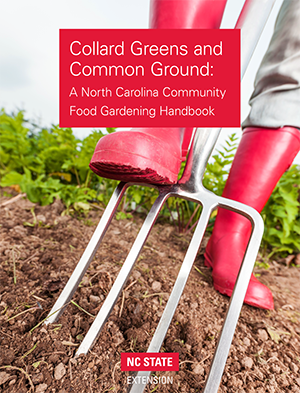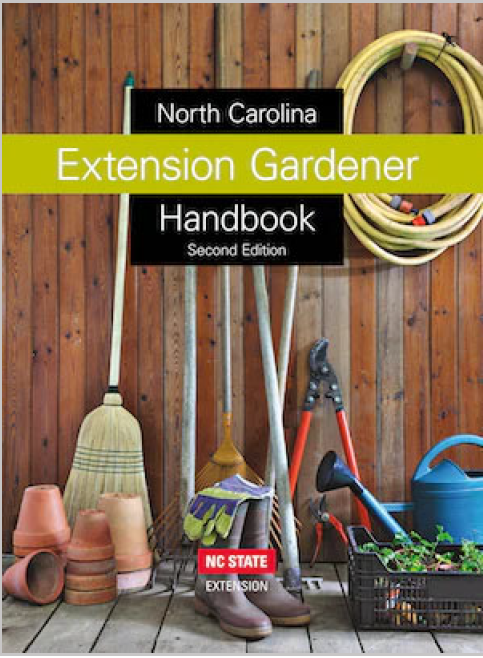Welcome!
We're glad you found your way to our NC State Extension Master Gardener℠ | Surry County website and hope that you find a lot of useful gardening information here!
Extension Gardener Plant Toolbox

The North Carolina Extension Gardener Plant Toolbox contains detailed descriptions and photographs of 4,635 plants that grow in and around North Carolina.
Use the plant toolbox to:
- find the perfect plant for a specific location in your garden
- identify a plant based on leaf and flower characteristics
For each of the 4,635 plants included in the Plant Toolbox database, a detailed profile is provided that includes growing conditions, maintenance, environmental benefit (or detriment), potential pests or diseases, and suggested use in the landscape. Each plant profile includes photographs.
This national award winning book, now in its second edition, was developed especially for Master Gardener volunteers and home gardeners and is a primary source for research-based information on gardening and landscaping successfully in North Carolina and the Southeast. A fundamental reference for any seasoned gardener, the North Carolina Extension Gardener Handbook is also written to appeal to beginners just getting their hands dirty. It explains the “why and how” basics of gardening from soils and composting to vegetable gardening and wildlife management. Advice on garden design, preparation, and maintenance covers all types of plantings including lawns, ornamentals, fruits, trees, and containers.
NC State Extension Publications and Factsheets
NC State Extension provides an extensive on-line catalog of research-based horticulture publications and factsheets written by authoritative sources. Publications can be browsed by "Category" (e.g., aquaculture, lawn & garden, pest management), by "Department" (e.g., Crop & Soil Services, Entomology & Plant Pathology, Horticulture), or by "Collection" (e.g., Insect and Related Pests of Flowers). Here are links to horticulture publications of specific departments:
- Horticulture [https://horticulture.ces.ncsu.edu/publications/]
- Integrated Pest Management (IPM) [https://ipm.ces.ncsu.edu/publications/]
- TurfFiles [https://www.turffiles.ncsu.edu/publications/]
- Plant Pathology [https://plantpathology.ces.ncsu.edu/publications/]
- Extension Gardener [https://extensiongardener.ces.ncsu.edu/publications/]
- Gardening [https://gardening.ces.ncsu.edu/publications/]
- Popular Publications [https://content.ces.ncsu.edu/

Collard Greens and Common Ground: A North Carolina Community Food Gardening Handbook (PDF)
Is a tool for organizing and managing a community garden in North Carolina covers the entire process, from the first steps in organizing a new garden to long-term strategies to keep gardens flourishing over time. The goal of this publication is to encourage the creation of successful and sustainable community gardens that benefit citizens across our state for decades to come.
Plant Disease and Insect Clinic (PDIC)
NC State's Plant Disease and Insect Clinic (PDIC) diagnoses plant and insect problems for farmers, growers, landscapers, homeowners, and gardeners. In consultation with expert faculty, PDIC recommends ways to treat or prevent the diagnosed problems. PDIC works in partnership with NC Cooperative Extension, whose county personnel can help identify common problems as well as assist you in properly collecting and submitting a sample to the PDIC.
For information on "How to Submit a Sample" to the NC State PDIC, visit: https://pdic.ces.ncsu.edu/how-to-submit/
Requests can be submitted elecronically. A handwritten request Form is available HERE.
TurfFiles
Lawns are living carpets that add beauty and recreational space to a home. Turf grass helps the environment by stabilizing soil and reducing air pollution, noise, heat, dust, and glare. An attractive, well-landscaped lawn may even add to a home’s value. Whether you are establishing a new lawn or renovating an existing one, deciding which type of grass to plant is the first step. Different types of grass thrive in different conditions, so it is important to pick a variety adapted to your location. A number of factors should be considered, including region, climate, intended use or wear at the site, and desired appearance. By choosing well-adapted grasses and planting them in the right location, a lush lawn will grow with minimal maintenance and pesticide use.
Visit the TurfFiles web portal for guidance on:
- selecting the a variety best suited to your conditions (e.g., rye, bermuda, fescue, bluegrass, zoysia)
- turfgrass weeds and weed control
- insects and other pests of turfgrasses
- disesses of turfgrass
For information on "How to Submit a Sample" to the NC State University Turf Diagnostics Lab, visit: https://turfpathology.ces.ncsu.edu/diagnostic-lab/
Soil Testing - North Carolina Department of Agriculture
Healthy Soil = Healthy Plants. Soil provides structural stability for plants and retains and relinquishes water and the nutrients necessary for plant growth. Soil testing provides valuable information on pH and plant-available nutrients. Test your soil before planting and every 2 to 3 years thereafter. To accurately determine your soil characteristics and the proper amount of lime and fertilizer to apply, contact the NC Department of Agriculture & Consumer Services (NCDA&CS).
Soil sample information and forms are available HERE.
- There is no charge for samples submitted between April and November.
- Between November 30 and March. 31, there is a charge of $4 per sample.
Boxes and forms for sampling are available from any Cooperative Extension office.
Extension Gardener Portal
Extension Gardener is the brand name for the NC State Consumer and Community Horticulture program. Providing information and training to support gardeners in choosing plants that will thrive in their location, minimizing the need for fertilizers, pesticides, and maintenance while maximizing the beauty, food production, and environmental benefits of their gardens, lawns, and landscapes. Read more at: https://extensiongardener.ces.ncsu.edu/about-extensiongardner/
NC State Gardening Information
The Gardening Portal at NC State University provides access to a wealth of information, events, and resources for gardeners in North Carolina. Managed by the State Consumer and Community Horticulture Specialist and Cooperative Extension Horticulture Agents throughout the state, it is your doorway to guidance about successfully growing vegetables, herbs, fruits, flowers, and ornamentals in your landscape.
NC State Extension Horticulture
Connecting research and teaching at the NC State University Department of Horticultural Science with the horticulture industry and the gardening public, Extension specialists and staff work with Extension Horticulture agents across the state to conduct applied, on-farm research, create tools and resources, and provide training. This portal is your gateway to learn more about the important work being done and the resources created for you. Read more at: https://horticulture.ces.ncsu.edu/about-horticulture-extension/
North Carolina EMGV portal
Since 1979, the NC State Extension Master Gardener℠ program has recruited, trained, and engaged people to serve as volunteer educators who strengthen Extension’s delivery of science-based horticultural knowledge to North Carolinians. Our mission is to connect people to horticulture through science-based education and outreach that empowers North Carolinians to cultivate healthy plants, landscapes, ecosystems, and communities. Read more at: https://emgv.ces.ncsu.edu/about-the-nc-state-extension-master-gardener-program/
Garden Help Directory
Explore resources from NC State Extension to help you garden better.
NC Cooperative Extension Service
NC State Extension extends research-based knowledge to all North Carolinians, helping them transform science into everyday solutions that improve their lives and grow our state. Do you have a question? NC Cooperative Extension County Centers locations and contact informaation can be found HERE. Read more at: https://www.ces.ncsu.edu/extension-strategic-plan-2030/


